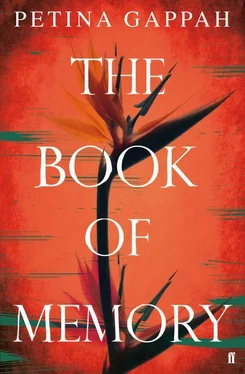But their hands when they touched me were rough and strong as they put stinging ointment on my broken skin. They seemed to think that they could scold away my illness if they shouted loud and long enough. ‘Why do you sit in the sun when you know you are so sick?’
I grew to fear the hospital, and when my father said we should go, I threw myself on the floor and grabbed a leg of the sofa and fought him when he tried to pick me up so that he often just gave up, and nature, when it chose, did the healing.
My mother rarely came to the hospital with us. Instead, she talked of consulting diviners. She was convinced that a potion or spell could be found that would make my problems disappear. Mine was not an illness, but a curse sent to her by her ancestors to punish her. This was the cause of some of the most frequent disagreements between my mother and father.
Oftentimes, my father just let my mother talk, her words a river washing over him without regard. She talked in declarative terms of the people from the east who were the only people in the country with forces powerful enough to counter the might of lightning and direct it to smite their enemies, and about the powerful runyoka spells cast by husbands to ensure that their wives were bound.
I recall an evening, perhaps a year before I was sold, when my father stopped my mother as she talked and said, ‘You know as well as I do why these things are happening. Why do you want to cause yourself more pain?’
She had been angry, and suddenly she changed mood and said, ‘Why don’t you just leave me? I know that is what you want to do. Just leave. That will end everything.’
My father said, ‘I will leave you only with my death.’
They were both very quiet after that, and my mother did not talk about diviners again that night.
Even though my father refused to sanction trips to healers, I recall at least three occasions when my mother and I left the house without my father’s knowledge. Each time, we visited a traditional healer, and each time, my mother swore me to silence. In dusty little rooms in the townships of Harare, my mother waited for ancestral spirits to visit little round men and women who acted as mediums. But I was still unwell, my skin still broke and bruised, and I remained unhealed.
The last time we visited such a place, we found the house empty, except for a small boy of my age who was all mango; there seemed to be more mango on his person than had made it into his stomach. He interested me because he saw out of one eye. The other was big and bulging and covered with his eyelid.
I watched him out of the corner of my eye. I longed to know what had happened to that eye but feared to ask because to ask would be to expect a response and I had learned that children did not always like to talk to me.
So I looked with longing at the mango; I watched him pull it out of his mouth with a plop. He said, without prompting, ‘You have come to consult the Great-Ancestor.’
‘We have come to consult the Great-Ancestor,’ my mother confirmed.
‘Mhamha,’ the child yelled, ‘there are people to see the Great-Ancestor.’
The shout was directed to the veranda of the neighbouring house, where a woman looked up from a group who had gathered to plait her neighbour’s hair. She had her own hair in a perm; the waves in it were damp with excess hair oil. Her breasts jutted from underneath a tee-shirt that bore the words NOT MY TYPE in shining gold letters.
‘You have come to see the Great-Ancestor,’ she said. ‘Wait here and we will call you in when he is approaching.’
‘Well,’ my mother said to me, ‘she is not what I expected but at least she is from Manicaland.’
The child reappeared. Cleaned of mango, he wore a small skirt of feathers and beads around his waist and carried a pair of traditional rattles in his hands. The Great-Ancestor had arrived, he said, and he would see us now. Inside the house, the medium had hidden her hair under a crown of feathers. She wore a cloth of red and black that fell from her shoulders like a cloak.
She let out a belch that must have fallen into my mother’s ears with added reassurance. Here at last was something familiar, a spirit that presaged its entry, as such spirits did, with grunts and groans. The spirits never announced themselves in anything that might resemble a normal human voice.
The woman took snuff, began to shake, and then she was still. In the midst of clapping and the child’s rattle-shaking, a deep voice issued from her mouth and said, ‘You are here because you are greatly troubled.’ The voice stopped; the woman seemed to go into a deep sleep. We waited and waited but nothing further happened. Only when my mother prodded her did the woman come back to herself.
After her return to earth, she and my mother had a slanging match, because my mother said she could not be expected to pay for nothing, while the woman said what was she to do, she could not control the comings and goings of the Great-Ancestor.
While our mothers shouted at each other, the little boy looked at me with a frank and unhesitating stare. His navel, I saw, stuck out in a little lump like on one of MaiPrincess’s twins.
‘Here,’ he said, and offered me a mango. He put down his hat of feathers, and sat next to me in his feathered skirt. I took the mango, and we sat on the stoep of their veranda, a small space between us, eating our mangos side by side as we listened to the voices of our mothers.
I will not pay, said mine. Oh, but you will pay, said his, otherwise you will find yourself facing worse things than your daughter’s skin. They went on like this for some time, but in the end my mother slammed down the money, stormed out and yanked my arm so that I dropped my mango.
I said, ‘Mhamha, my mango.’
‘How many times have I told you not to eat at people’s houses?’ she said, and gave me a slap. I held back my tears and did not look back at the boy. Instead, I held on to the remaining taste of mango until we reached home.
That night, when my father found out where we had been, he hit my mother full in the face with his fist. This was the only time that I recall my father ever hitting my mother. Until that day, he had been, like my sisters and me, the recipient of my mother’s blows.
It was always she who attacked him, hitting him in his face while he attempted to restrain her and cover his face at the same time. He would hold his arms to his face as she went for his chest and his arms. He held her fists sometimes, and it was then that he called her name, and pleaded with her and said, ‘Moira, Moira, ndapota ’, and it was terrible to hear them, more terrible than it was to hear the sounds they made in their room when my mother cried out in the night.
That night I heard a sound from the back of our house. It was my father, crying deep gasping sobs, like he was out of breath after running a hard race, a race that he had won but had somehow still managed to lose.

If there is one thing that I can say I like about prison, it is that there are no baths. I have always hated water. I could not bear even to wash my face in it. I get through that morning ritual only by holding my breath and washing very quickly. It is an irrational fear, but I cannot bear to be near any body of water. This is why the hardest thing I did that night was not to dress Lloyd’s naked body, or remove the belt from his neck, but to drag his body to the swimming pool at Summer Madness.
I still dream of drowning. Perhaps it is because I almost did when the Baptist held my head under the waters of the Mukuvisi, and again when one of the girls at the Convent pushed me into the swimming pool.
Читать дальше













